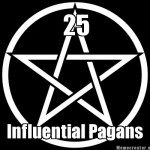 I’m a sucker for religious programs and historical dramas. Put the word “Bible” into the title of a basic cable series and I’m usually there. (Oh, how I miss you Mysteries of the Bible!) If you share my passion for all things religious and spiritual you might have stumbled across The History Channels’s The Bible last night, produced by Mark Burnett (Survivor) and Roma Downey (Touched By an Angel). I found the show pretty awful across the board (though the actors certainly seemed to be giving it their all), but much of America disagreed. It pulled in thirteen million viewers, most of them from the Sunday Church Crowd (my guess).
I’m a sucker for religious programs and historical dramas. Put the word “Bible” into the title of a basic cable series and I’m usually there. (Oh, how I miss you Mysteries of the Bible!) If you share my passion for all things religious and spiritual you might have stumbled across The History Channels’s The Bible last night, produced by Mark Burnett (Survivor) and Roma Downey (Touched By an Angel). I found the show pretty awful across the board (though the actors certainly seemed to be giving it their all), but much of America disagreed. It pulled in thirteen million viewers, most of them from the Sunday Church Crowd (my guess).
 I’m not going to get into the absurdity of the series its self, though Noah telling the first creation story in Genesis with a Scottish brogue all while attempting to plug leaks in his ark was pretty hilarious. (I was reminded of the show Killer Karaoke a few times.) I also won’t get into the Angel Battle Ninjas ™ at Sodom, and I’m not exaggerating there, promise. The Bible television show is a blood soaked nightmare with limited production values (kind of like the real thing), though I’ll give the producers credit for not casting any blondes.
I’m not going to get into the absurdity of the series its self, though Noah telling the first creation story in Genesis with a Scottish brogue all while attempting to plug leaks in his ark was pretty hilarious. (I was reminded of the show Killer Karaoke a few times.) I also won’t get into the Angel Battle Ninjas ™ at Sodom, and I’m not exaggerating there, promise. The Bible television show is a blood soaked nightmare with limited production values (kind of like the real thing), though I’ll give the producers credit for not casting any blondes.
My biggest problem with The Bible (apart from the Angle Battle Ninjas ™) was its lack of humor. Everything about it was demanding that I take its Biblical stories with utmost seriousness. Scottish brogue Noah should have provided a moment of comic relief, or at least a smile, instead there are storms in the sky and children being told that God loves the world so much that he’s killing nearly every living thing on it. Happy times. This is not new though, monotheisms (especially Christianity and Islam) are always serious about their mythology, even when it desperately cries out for a wink and a nod.
 So many Christians demand literal interpretations of everything in the Bible, no matter how absurd or fanciful, and it borders on maddening. I don’t mean to mock or trash on anyone’s religion here, I just wish more Christians* were able to accept their stories for what they are, mythology. It should also be completely OK to be bothered by parts of that mythology. No one should have to try and rationalize Yahweh telling Abraham to sacrifice his second son as a literal thing. It’s disturbing, creepy, and really pretty horrible, but crazy-guy with voices in his head is always being analyzed as an historical figure, more George Washington than King Arthur.
So many Christians demand literal interpretations of everything in the Bible, no matter how absurd or fanciful, and it borders on maddening. I don’t mean to mock or trash on anyone’s religion here, I just wish more Christians* were able to accept their stories for what they are, mythology. It should also be completely OK to be bothered by parts of that mythology. No one should have to try and rationalize Yahweh telling Abraham to sacrifice his second son as a literal thing. It’s disturbing, creepy, and really pretty horrible, but crazy-guy with voices in his head is always being analyzed as an historical figure, more George Washington than King Arthur.
As a Hellenic-leaning Pagan I love Greek mythology. I wrap my rituals in it (Saturday is the feast day of Aphrodite and Adonis), and I see it in my day to day life. When I look at the pan-pipes adorning my altar I think of Syrinx running away from Pan and eventually turning into a stand of reeds, but I don’t take it all literally. I’m not going to get into a long theological argument over whether or not Syrinx actually turned into plant matter, because I really don’t care. It doesn’t matter to me one iota, and if anyone ever made a Pan movie I’d be overjoyed to see Syrinx wink at the camera before undergoing her transformation. Myth can certainly be serious, but there’s no crime with adding a dash of fun to the proceedings.
While watching the History Channel last night I couldn’t help but compare the tale of Pan and Syrinx to the story of Lot, his family, and Sodom. Lot’s tale ends with his wife being turned into a pillar of salt, and all for just having the gall to turn around and witness the destruction of Sodom. There’s no love or joy in that story, and it’s all presented as a matter of fact. With all of the material in the Bible, Yahweh turning a woman into salt for looking over her shoulder is what you want to go with?
(The whole enterprise could have been redeemed if last night’s retelling had ended with the narrator saying “and she was the most delicious salt any of them had ever tasted.” I also can’t help but think of how the story of Lot’s wife would be interpreted if it was a tale from Classical Mythology. I’m sure everyone would talk about her transformation as simply an explanation for why the Dead Sea is so full of salt.)
It’s a shame that the more fanciful Bible stories aren’t interpreted for what they are more often. It’s mythological narrative, not a history book, and that should be OK. Christianity doesn’t invoke negativity in so many Pagans because of Jesus, or the stories. It makes a lot of us angry because of the the absurd notion that its stories and tall tales always have to be something more than that. Why is one chapter in the book of world mythology always treated as history, and the rest as simply story?
Pagandom doesn’t get wound up when the story of Cerridwen and Gwion Bach is presented as legend instead of fact. We recognize such tales for what they truly are. They are stories, they are myth, and they speak truths much like Aesop’s fables. Things don’t always have to be “literally” true for them to be true. I believe in magick, but I don’t think it can be used to guide thousands of animals onto a giant boat made by the hands of just one dude. Belief in the supernatural has to walk hand in hand with some degree of skepticism.
 As nasty as Yahweh is in The Torah, it’s surprising that more people don’t interpret those stories in a less literal way. Yahweh is certainly not a deity of love, peace, or tolerance in the Old Testament. I’d certainly sleep better if I were a Christian believing those stories were only meant metaphorically. Thinking back to last night’s almost sacrifice of Issac, it’s a much more comfortable story when looked at through the lens of myth instead of the lens of history. (I know when I brought up such things in Sunday school, I was given the “God sometimes wants us to suffer and to test our faith.” Baloney. If that’s the case it’s no wonder I passed on your god decades ago.)
As nasty as Yahweh is in The Torah, it’s surprising that more people don’t interpret those stories in a less literal way. Yahweh is certainly not a deity of love, peace, or tolerance in the Old Testament. I’d certainly sleep better if I were a Christian believing those stories were only meant metaphorically. Thinking back to last night’s almost sacrifice of Issac, it’s a much more comfortable story when looked at through the lens of myth instead of the lens of history. (I know when I brought up such things in Sunday school, I was given the “God sometimes wants us to suffer and to test our faith.” Baloney. If that’s the case it’s no wonder I passed on your god decades ago.)
I’m not one for claiming that my religion is superior to other belief systems, but Paganism does have a lot of strengths missing in other faith traditions. We can laugh at ourselves, and we can laugh at our myths. Most of us don’t draw definitive lines in the sand, and the majority of us seem to be OK accepting mythology as mythology and historical fact as historical fact. We also aren’t so intractable that we are OK with accepting new information, even when it might conflict with something we desperately want to believe in.
Unless there’s a large demand for future snark I’m probably done with The Bible on The History Channel. It was completely lacking in joy, and seemed to flip from one violent moment to the next. I’m spiritual because it brings me happiness. Show me a TV version of The Bible containing a little bit of that and we might be back in business.
*Jews have always been a lot better about not taking it all so literally.













